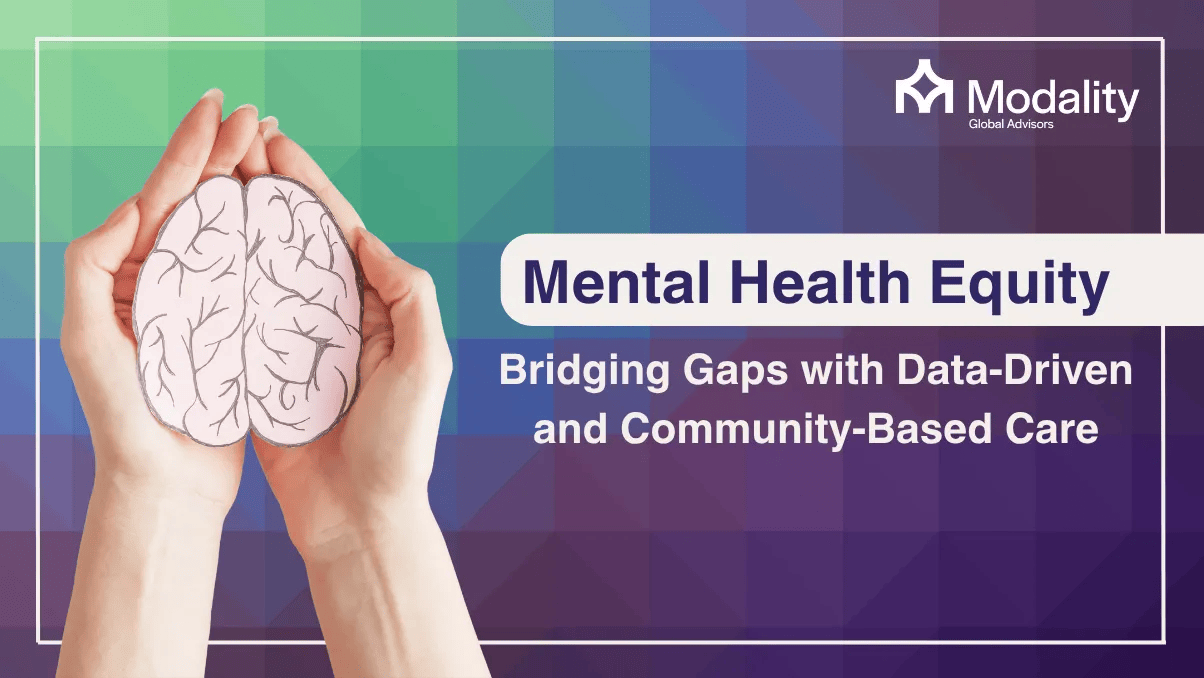Mental Health Equity: Bridging Gaps with Data-Driven, Community-Based Care
Closing the Mental Health Equity Gap: From Data to Dignity
One in five adults experiences a mental health condition each year—yet fewer than half receive care. This isn’t only a clinical shortfall; it’s a systemic equity failure marked by barriers in access, affordability, cultural relevance, and geography. Modality Global Advisors (MGA) helps health systems move from awareness to action with equity-centred strategies that scale.
The Numbers: Inequity in Plain Sight
- Black and Hispanic adults are ~50% less likely than white adults to receive therapy.
- Rural regions face a 60–65% workforce shortfall; 15M+ Americans live in counties with no mental health professionals.
- LGBTQ+ youth are 4× more likely to experience depression and attempt suicide.
- 45% cite cost as the main barrier to care.
Root Causes: Why the Divide Persists
- Geography & logistics: Long waits (25+ days in many communities) and travel burden; telehealth can raise utilisation by ~200% in rural areas.
- Systemic & economic barriers: Lower Medicaid reimbursement reduces participation; language access gaps affect 14.2M adults; stigma fuels higher dropout.
- Cultural fit: Black and Hispanic psychologists <4% of the workforce vs 32% of population; mistrust grows when care isn’t culturally attuned.
Two Levers for Change
1) Data-Driven Methods
- Risk stratification to flag rising-risk patients before crisis.
- AI-powered outreach to reduce avoidable ED use by up to ~45%.
- Integrated clinical + SDOH data to personalise plans and target deserts.
2) Community-Based Care Models
- Integrated behavioural health in primary care/FQHCs—depression screening up ~25%.
- Telehealth + mobile outreach expand access >200% in remote areas.
- Digital tools and text-based therapy improve adherence for younger and minority patients.
MGA: Making Equity Measurable
- Equity mapping: Predictive analytics + local SDOH to identify “mental health deserts.”
- Culturally competent models: Language access, stigma-informed engagement, trusted community partners.
- Integrated care: Behavioural health embedded in primary care and community hubs.
- Digital scale: Telehealth, eCBT, asynchronous messaging, and remote monitoring with equity safeguards.
- Value-based equity: Align contracts, operations, and KPIs with health-equity incentives.
| Equity KPI | How to Measure | Outcome Signal |
|---|---|---|
| Access gap closure | Visits/1k by race/ZIP/language | Fair reach across communities |
| Engagement & continuity | No-show, dropout, PHQ-9 follow-up | Sustained participation |
| Clinical improvement | PHQ-9/GAD-7 change, crisis events | Reduced severity, fewer ED visits |
| Experience & trust | CAHPS, language concordance, PROMs | Higher satisfaction & trust |
The Path Ahead
Equity in mental health is a social imperative and a strategic necessity. With payers tying reimbursement to equity outcomes, now is the time to operationalise change. The future is community-rooted, data-informed, and justice-driven.
Ready to turn equity into outcomes? Partner with Modality Global Advisors to design and scale equitable mental health systems: hello@modalityglobal.com.






